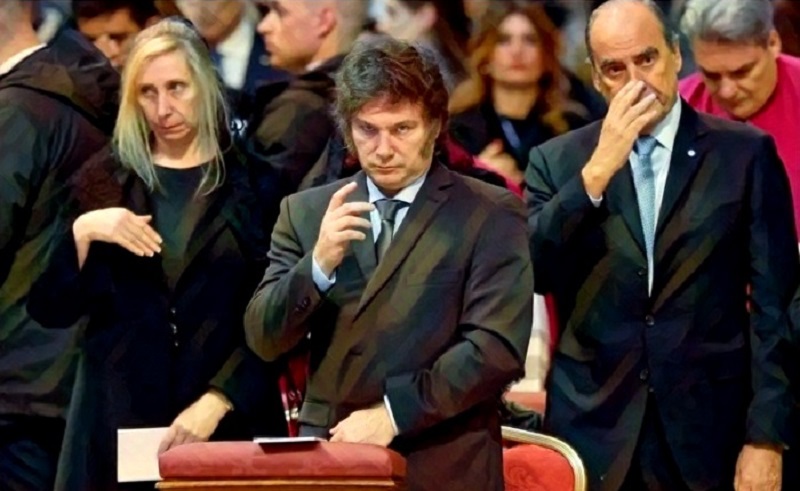
Between Thursday night and Friday morning, the national government obtained its first laws after almost seven months. After a marathon process that began in the summer and ended this week – with multiple crises in between – the government managed to approve the Law of Bases and the Fiscal Package, although along the way it had to leave hundreds of articles and abandon its initially “intransigent” attitude to 100% adopt the methods of the caste: with Minister Guillermo Francos empowered as the head of the Cabinet, they distributed positions, perks and budgetary resources so that a government that is a minority in both chambers of the National Congress could buy the votes it was missing.. Not only that: the fiscal package was also questioned in its legality given that the Chamber of Deputies insisted on points – such as the restitution of the salary tax – that had been rejected by the Senate. As deputy Nicolás del Caño said “this law is a corruption scandal comparable to the ‘deputrucho’ or Menem’s Banelco Law.”
Indeed, the “opposition” – crossed by multiple internal ones – was essential for the laws to be approved. From the usual collaborators of the PRO, the UCR, We Make the Federal Coalition or provincial blocks – with names like Lucila Crexell or Martín Lousteau who will forever be associated with the scandal – to the Peronism that, although on the one hand the majority voted in against and made speeches of denunciation, the reality is that it is also worth noting that he had sectors that gave him essential votes without which the vote in general in the Senate would not have passed (such as Edgardo Kueider and Carlos Mauricio Espínola), as well as “contributed “hands for voting in particular on different points in both chambers. Peronism also – and this is central – provided the “essential service” of the betrayal of the CGT and CTA bureaucrats who first – and beyond the nuances between their different wings – made lukewarm mobilizations and speeches and then directly erased themselves. from the streets, letting through a brutal package of adjustment and delivery laws. They are all the actors responsible for the approval of issues such as labor reform, money laundering, the attack on public employment, the delegation of superpowers to the far-right Javier Milei so that he concentrates even more power, the restitution of the salary tax, the reduction of taxes on the richest or the delivery and looting mechanisms for the great economic power with the RIGI, among others.
He management package It was completed with the repressive deployment of Patricia Bullrich, who sought to install a true regime of police discipline to prevent social protest, repressing and detaining with the most absolute arbitrariness, with the complicity of prosecutor Carlos Stornelli. A huge united front of tens of thousands of signatures and national and international personalities defeated this attempt, although the fight continues for the five people who are still detained. This repressive attitude contrasts greatly with the lukewarmness and delay of the ruling party in condemning the military riot that occurred this week in Bolivia.
Different from that of all these actors was the attitude of the left. Its deputies, such as Myriam Bregman, Nicolás del Caño, Christian Castillo, Alejandro Vilca and Romina del Plá were fundamental from the beginning to make known to the entire population what they wanted to vote for. Also to denounce, in recent days, that the entire treatment is tainted with nullity, because it is a law tainted by corruption. Last but not least, for having promoted, together with tens of thousands of people, from the beginning, the mobilization from neighborhood assemblies, places of work or study, in a block that starred, for example, in an important mobilization when voted in the Senate and that continued until the end that day when the few union bureaucrats who had gone withdrew their columns.
The result is a step by the government to approve these laws, which avoids a major crisis. If they were not approved, the government would have been left hanging, without “political volume” or the slightest “governability” to carry out its plan. Big capital celebrates, although it is impossible to separate this result from what is coming: In the context of a major recession and financial instability, new conflicts are looming. Both the IMF and the rural employers are demanding a new devaluation from the government. (among other measures such as the increase in public service rates), which if carried out would put inflation in check and constitute a new blow to the popular pockets. The liberal economic scheme does not work – there is a reserve crisis, doubts about how the restrictions could be lifted and about what engines there could be to get out of the recession – and on the horizon appear monumental debt payments that mortgage the future of the country and are legitimized by one government after another. There are rumors – not verified – that Minister Caputo could make announcements in the next few days. In the next few months a new agreement with the IMF will be discussed, which under these demands and in the framework of a world in crisis, can only deepen the national decline in a country in which only a few powerful people celebrate, while the great majority sees their living conditions worsen. The ties to the IMF are not exclusive to this government, but the Peronism of Alberto Fernández, Cristina Kirchner and Sergio Massa has also demonstrated the disaster that can result from not being willing to break ties with this illegal and fraudulent submission. that requires subjecting the entire national economy to the service of paying an illegitimate debt, not to mention Macrismo, which was the one who brought him back to the country. Today, Axel Kicillof’s Peronism also avoids proposing a break with the IMF and non-payment of debt to speculators.
Once this stage is over, The bases are there, but so is the crisis. A government that was only able to achieve this approval with great difficulty is facing a new moment, without the excuse of not having the laws. Furthermore, it is doubtful that the laborious block that was built to pass these norms will be repeated. Time does not pass in vain and it is true that in recent times, internal disputes and resignations in the cabinet, the scandals of Sandra Pettovello’s ministry, the disappearance of Loan or the fact that Javier Milei in caste mode He has already made nine tours abroad and through Argentina in crisis only happens from time to timeThere are also growing doubts about the plan, even among orthodox economists and among sectors of the ruling classes that live off the domestic market.
Now the government – whose main point of support remains the failure of all previous governments that left behind a huge economic, political and social crisis – will face the challenge of showing results., in an adverse context and with living conditions that have only worsened savagely during his administration, with 55% of the population living below the poverty line and an increase in inequality. For the workers and the people, new struggles lie ahead that must be organized and coordinated – as they were anticipating, even with their limitations – the rebellion in Misiones, the “and a half” general strike, the massive university march, the drivers’ struggle of the UTA, on March 8 or different ongoing conflicts -, for which it is necessary to confront and overcome the union, social and student bureaucracies. In the heat of these fights, the challenge grows to continue building a socialist and revolutionary political alternative, in the face of savage liberalism and Peronism, whose recipes have failed again and again in recent years.
Source: www.laizquierdadiario.com

